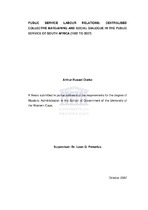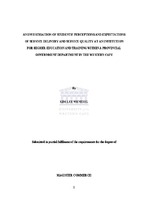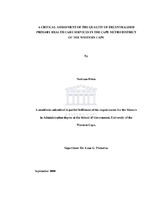| dc.contributor.advisor | Pretorius, Leon G. | |
| dc.contributor.author | Clarke, Arthur Russel | |
| dc.contributor.other | School of Government | |
| dc.contributor.other | Faculty of Economics and Management Sciences | |
| dc.date.accessioned | 2013-10-24T09:50:43Z | |
| dc.date.available | 2009/10/22 15:05 | |
| dc.date.available | 2009/10/23 | |
| dc.date.available | 2013-10-24T09:50:43Z | |
| dc.date.issued | 2007 | |
| dc.identifier.uri | http://hdl.handle.net/11394/2354 | |
| dc.description | Magister Administrationis - MAdmin | en_US |
| dc.description.abstract | Through South African labour legislation, bargaining councils are empowered to conclude collective agreements between employers and trade unions. While bargaining councils were created for virtually every sector within the South African private sector, only one bargaining council exists for the public sector. This public sector bargaining council is known
as the Public Service Co-ordinating Bargaining Council (PSCBC). The PCSBC subsequently established four sectoral councils to further collectively bargain on matters pertaining to sectoral issues relevant to the sector it represents. However, the PSCBC remains the apex of these four
public service sectoral bargaining councils. This thesis focuses on how the Public Service Co-ordinating Bargaining Council (PSCBC) contributes to social dialogue within South African public service. This thesis seeks to fill a significant literature gap on collective bargaining as accomplished by the PSCBC. The thesis briefly examines the history of collective bargaining in the South African public service. The
research methodology utilised includes information gleaned from annual reports published by the PSCBC. Interviews of selected stakeholders such as government officials and labour organisations involved in the PSCBC were conducted. The PSCBC objectives are identified and analysed against the performance of the PSCBC for the period 1997 to 2007. The
relevant PSCBC role players are identified. The power realities between these role players are reflected. The criteria for remaining a party to these PSCBC will be explained. The thesis holds that historically an adversarial relationship existed
between the state as employer and the recognised trade unions. The establishment of the PSCBC created the opportunity for the historical adversaries between an employer and trade union to be converted into social dialogue interactions, which are commonly believed to be a better
approach in resolving their differences. | en_US |
| dc.language.iso | en | en_US |
| dc.publisher | University of the Western Cape | en_US |
| dc.subject | Labour Relations Act 66 of 1995 | en_US |
| dc.subject | Public Service Co-ordinating Bargaining Council (PSCBC) | en_US |
| dc.subject | Public service trade union membership | |
| dc.subject | Public service collective bargaining | |
| dc.subject | Voting weights of parties admitted to PSCBC | |
| dc.subject | PSCBC objectives | |
| dc.subject | Dispute resolution | |
| dc.subject | COSATU, FEDUSA, CONSAWU | |
| dc.subject | Sectoral councils | |
| dc.subject | Definition of the public service | |
| dc.title | Public Service Labour Relations: Centralised Collective Bargaining and Social dialogue in the Public Service of South Africa(1997 to 2007) | en_US |
| dc.type | Thesis | en_US |
| dc.rights.holder | University of the Western Cape | en_US |
| dc.description.country | South Africa | |



